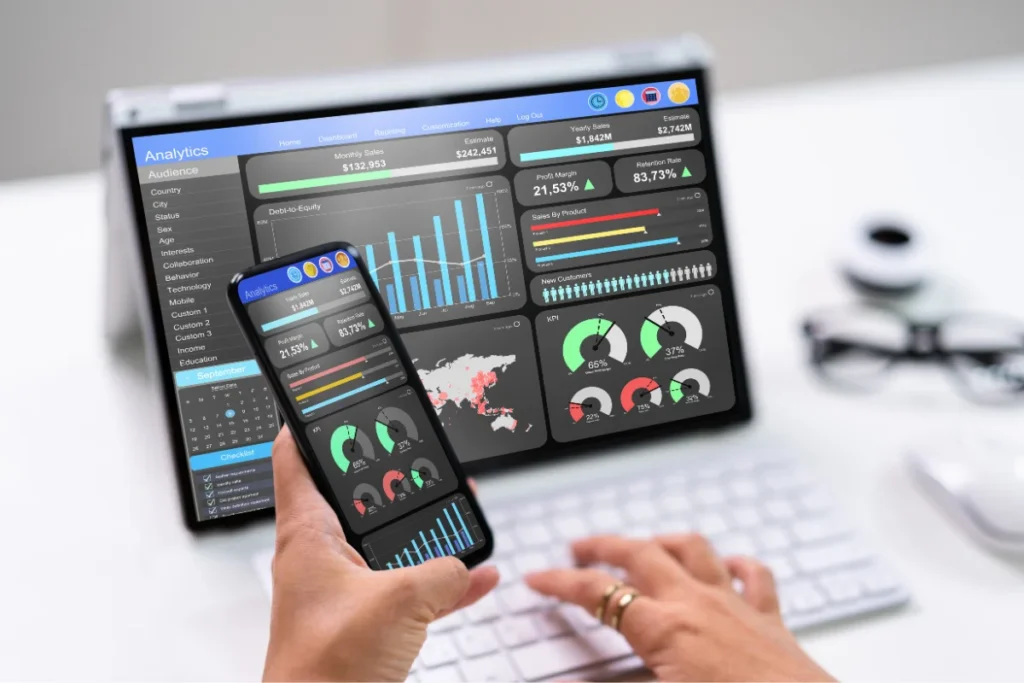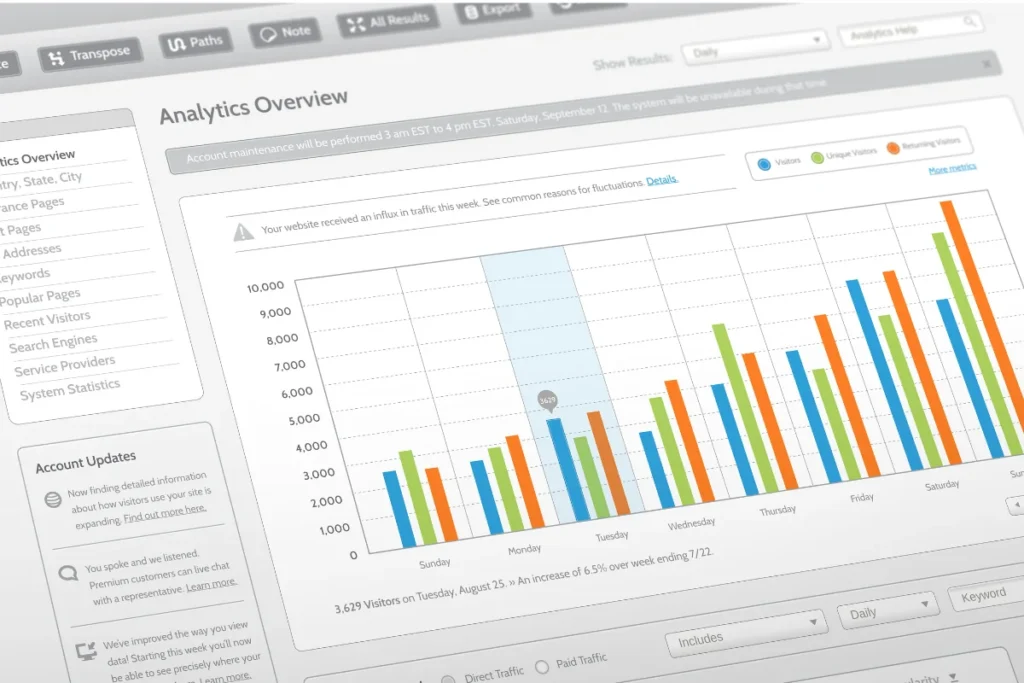
Introduction of Google Analytics in Digital Marketing Agency
In the busy digital landscape of Ahmedabad, where businesses are struggle to Cut their niche online, the Importance of Google Analytics in Digital Marketing Agency is pivotal. These agencies play a crucial role in helping businesses establish their online presence, reach their target audience, and achieve their marketing goals. In this digital era, where data reigns supreme, harnessing the power of analytics is imperative for the success of digital marketing efforts. Among various analytics tools, Google Analytics stands out as a cornerstone for digital marketing agencies, providing invaluable insights that drive informed decision-making and strategic planning.
Understanding Google Analytics
Google Analytics is a web analytics service offered by Google that tracks and reports website traffic. It offers a comprehensive set of tools for analyzing website performance, user Behaviour, and engagement metrics. From traffic sources to audience demographics, and from conversion tracking to campaign analysis, Google Analytics provides a wealth of data to understand how users interact with a website.


Importance of Google Analytics in Digital Marketing Agency
In the fast-paced world of digital marketing, where every click, view, and engagement matters, data-driven decision-making is the key to success. This is where Google Analytics steps in as an invaluable tool for digital marketing agency. Let’s examine importance of Google Analytics in Digital Marketing Agency in more detail:
Comprehensive Data Insights:
Google Analytics provides a treasure trove of data about website visitors, their behavior, and interactions. From basic metrics like the number of visitors and page views to more advanced insights like user demographics, interests, and devices used, Google Analytics offers a comprehensive view of website performance. This wealth of data allows digital marketing agencies to understand their audience better and tailor their marketing strategies accordingly.
Performance Tracking:
For digital marketing agencies, tracking the performance of marketing campaigns is essential to assess their effectiveness and optimize future efforts. Google Analytics enables agencies to monitor various metrics such as traffic sources, campaign performance, and conversion rates in real-time. By tracking these metrics, agencies can identify which channels and campaigns are driving the most traffic and conversions, allowing them to allocate resources strategically and maximize ROI.
Audience Segmentation:
One of the key advantages of Google Analytics is its ability to segment website visitors based on various criteria such as demographics, behavior, and acquisition channels. This segmentation allows digital marketing agencies to target specific audience segments with personalized marketing messages and offers. By tailoring their marketing efforts to the unique needs and preferences of different audience segments, agencies can improve engagement, conversion rates, and overall campaign performance.
Goal Tracking and Conversion Attribution:
Setting up goals in Google Analytics allows digital marketing agencies to track specific actions that users take on a website, such as making a purchase, filling out a form, or signing up for a newsletter. By tracking these goals, agencies can measure the effectiveness of their marketing campaigns and attribute conversions to the appropriate channels and touchpoints. This insight into conversion attribution helps agencies understand which marketing channels and tactics are driving the most valuable outcomes and optimize their strategies accordingly.
Data-Driven Decision-Making:
In today’s competitive digital landscape, gut feelings and intuition are no longer enough to drive success. Digital marketing agencies need to rely on data-driven insights to make informed decisions and stay ahead of the curve. Google Analytics provides the data and analytics tools needed to evaluate performance, identify trends, and uncover actionable insights. By basing their decisions on empirical evidence rather than guesswork, agencies can optimize their marketing strategies for maximum impact and ROI.
Client Reporting and Accountability:
For digital marketing agencies, transparency and accountability are essential for maintaining client trust and satisfaction. Google Analytics enables agencies to generate detailed reports that showcase the results of their marketing efforts in a clear and transparent manner. These reports provide clients with valuable insights into key metrics such as website traffic, engagement, and conversions, allowing them to see the tangible impact of the agency’s work. By demonstrating measurable results and ROI, agencies can strengthen client relationships and build long-term partnerships.
In essence, Google Analytics serves as a cornerstone for digital marketing agencies, providing them with the tools and insights needed to drive success in an increasingly data-driven world. By leveraging the power of Google Analytics, agencies can gain a deeper understanding of their audience, track the performance of their marketing campaigns, and make informed decisions that drive tangible results for their clients.
How Google Analytics Empowers Digital Marketing Agency
Tracking Website Traffic:
Google Analytics allows digital marketing agencies to track various aspects of website traffic, including the number of visitors, their geographical location, the devices they use, and the pages they visit. This information helps agencies understand their audience better and tailor their marketing strategies to meet their needs effectively.
Analyzing Audience Behavior:
Understanding user behavior is crucial for crafting personalized and targeted marketing campaigns. Google Analytics provides insights into how users navigate through a website, which pages they spend the most time on, and where they drop off. By analyzing this data, digital marketing agencies can identify trends, preferences, and areas for improvement to enhance the user experience and drive conversions.
Measuring Campaign Effectiveness:
Digital marketing agencies run various campaigns across different channels, such as social media, email, and search engines, to promote their clients’ businesses. Google Analytics enables agencies to track the performance of these campaigns in real-time, monitoring metrics such as click-through rates, conversion rates, and return on investment (ROI). By evaluating campaign effectiveness, agencies can allocate resources wisely and optimize their marketing efforts for better results.
Enhancing Conversion Rate Optimization (CRO):
Conversion rate optimization (CRO) is the process of improving the percentage of website visitors who take a desired action, such as making a purchase or filling out a form. Google Analytics provides valuable insights into the conversion funnel, highlighting areas where visitors may be dropping off or encountering obstacles. Armed with this data, digital marketing agencies can implement targeted strategies to streamline the conversion process and maximize conversions.
Improving Return on Investment (ROI):
At the end of the day, digital marketing agencies are accountable for delivering tangible results to their clients. Google Analytics plays a crucial role in measuring the ROI of digital marketing efforts by tracking key metrics such as revenue, cost per acquisition (CPA), and customer lifetime value (CLV). By analyzing these metrics, agencies can demonstrate the impact of their work and make data-driven recommendations for optimizing marketing strategies.
Case Studies: Google Analytics Success Stories of Digital Marketing Agency in Ahmedabad
Let’s take a look at some real-life examples of how Digital Marketing Agency in Ahmedabad have leveraged the power of Google Analytics to drive success for their clients:
Case Study 1:
XYZ Digital Marketing Agency, based in Ahmedabad, used Google Analytics to track the performance of a social media advertising campaign for a local e-commerce store. By analyzing user engagement metrics and conversion data, they were able to optimize ad targeting and creative content, resulting in a 30% increase in website conversions and a significant boost in revenue for the client.
Case Study 2:
ABC Marketing Solutions, another prominent agency in Ahmedabad, utilized Google Analytics to identify opportunities for website optimization for a B2B client in the manufacturing industry. By conducting A/B tests and analysing user behaviour data, they were able to enhance the website’s usability and streamline the lead generation process, leading to a 20% increase in lead conversions within a month.
These case studies illustrate the Solid impact of Google Analytics on the success of digital marketing campaigns and the value it brings to businesses in Ahmedabad.
In conclusion, Google Analytics is an indispensable tool for digital marketing agencies in Ahmedabad, enabling them to gain valuable insights into website performance, user behavior, and campaign effectiveness. By harnessing the power of data, agencies can optimize their strategies, drive conversions, and deliver measurable results for their clients. As the digital landscape continues to evolve, the role of Google Analytics will only become more critical in shaping the success of digital marketing efforts in Ahmedabad and beyond.
